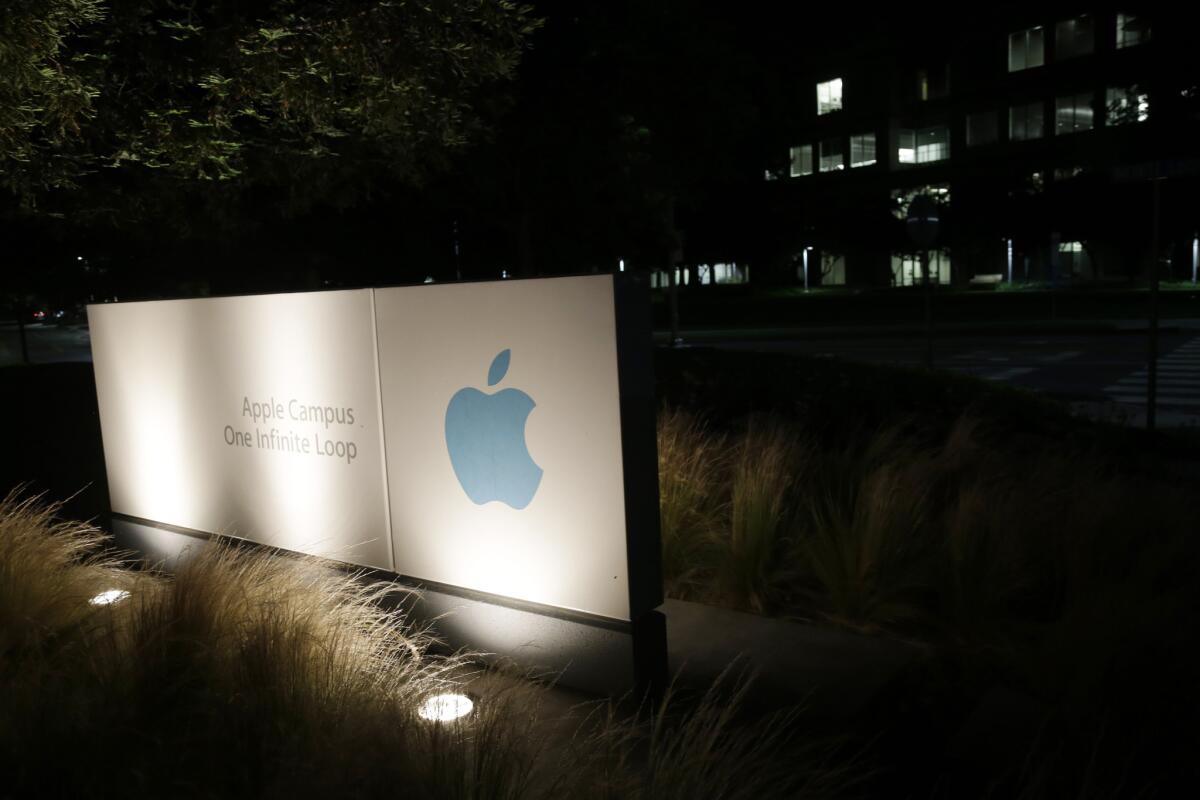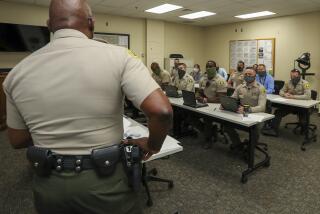Apple vs. FBI: Congressman urges Comey to drop demands, ‘take a deep breath’

A group is planning protests at different Apple locations, including the company headquarters, in Cupertino.
- Share via
Amid the tense standoff between the FBI and Apple, a Los Angeles congressman on Tuesday urged FBI Director James Comey to drop the demand the tech giant help the agency unlock the iPhone of one of the San Bernardino terrorists.
Rep. Ted Lieu (D-Los Angeles) wrote in a letter to Comey that it should be up to Congress, “stakeholders, and the American public debate and resolve these difficult issues, not unelected judges.”
Lieu expressed concern about the courts deciding the issue based on a 1789 law, which he said does not take into account the complexities of today’s technology.
“Let’s all take a deep breath and start talking to each other instead of fighting in court,” he wrote.
Meanwhile, Microsoft founder Bill Gates weighed in on the controversy, seeming to question Apple’s claims that the FBI’s request represented an unprecedented inquiry to violate the privacy of customers.
“This is a specific case where the government is asking for access to information. They are not asking for some general thing; they are asking for a particular case,” Gates told the Financial Times. “It is no different than ... should anybody ever have been able to tell the phone company to get information ... should anybody be able to get at bank records.”
Gates stance puts him at odds with some others in the tech world, including Apple, for whom his company was a great rival for years. The company and others have argued the FBI request marks a dangerous precedent.
Demonstrations are planned across the nation Tuesday in support of the tech giant’s refusal to unlock the San Bernardino gunman’s iPhone. The protest is being organized by a group called Fight for the Future, which has organized previous demonstrations on tech issues.
According to the group, protests will take place in San Francisco and Los Angeles and at Apple’s Silicon Valley headquarters and FBI headquarters in Washington, among other places. The group said backers will carry banners saying “FBI: Don’t Break Our Phones” and “Secure Phones Save Lives.”
A new Pew poll showed 51% of respondents supported the FBI’s effort to force Apple to help in the terror probe.
On Monday, Apple Chief Executive Tim Cook sent a letter to employees saying: “The case is about much more than a single phone or a single investigation. At stake is the data security of hundreds of millions of law-abiding people, and setting a dangerous precedent that threatens everyone’s civil liberties.”
Comey had said in a statement Sunday that the scale of the San Bernardino attacks, which left 14 people dead and 22 injured, warranted the pursuit of all leads, including reviewing Syed Rizwan Farook’s iPhone 5c.
“I hope folks will take a deep breath and stop saying the world is ending, but instead use that breath to talk to each other,” Comey said.
“We simply want the chance, with a search warrant, to try to guess the terrorist’s passcode without the phone essentially self-destructing and without it taking a decade to guess correctly. That’s it,” Comey said. “We don’t want to break anyone’s encryption or set a master key loose on the land.”
Comey’s statement served as a rejoinder to comments made earlier in the day by Apple attorney Ted Olson, who predicted the FBI’s request would unleash a “Pandora’s box” and compromise the privacy of millions of Apple customers.
“There’s no limit to what the government could require Apple to do if it succeeds this way,” Olson told host George Stephanopoulos on ABC’s “This Week.” But Apple “has to draw the line at re-creating code, changing its iPhone, putting its engineers and creative talents to destroy the iPhone as it exists,” Olson said.
Cook’s employee memo was obtained by several news organizations, including the Verge and BuzzFeed. Apple also issued a Q&A to its customers.
“The order would set a legal precedent that would expand the powers of the government, and we simply don’t know where that would lead us. Should the government be allowed to order us to create other capabilities for surveillance purposes, such as recording conversations or location tracking? This would set a very dangerous precedent,” the Q&A said.
The FBI has been investigating the Dec. 2 attack by Farook and his wife, Tashfeen Malik, who stormed into the Inland Regional Center and gunned down his coworkers from the San Bernardino County Public Health Department.
Investigators believe Farook’s smartphone, issued to him by the county, “may contain critical communications” around the time of the shooting. The FBI has a warrant to search the iPhone, but Apple’s encryption technology erases the phone’s data after 10 failed attempts to break the passcode.
After the San Bernardino shooting, Apple provided the FBI with data from Farook’s work iPhone that he had backed up remotely. But he did not save to iCloud from Oct. 19 to the date of the attack, leaving about seven weeks of potential messages, texts and photos for investigators to review.
“Maybe the phone holds the clue to finding more terrorists. Maybe it doesn’t,” Comey said Sunday. “But we can’t look the survivors in the eye, or ourselves in the mirror, if we don’t follow this lead.”
Last week, U.S. Magistrate Judge Sheri Pym of Riverside ordered Apple to aid the FBI in unlocking the phone. Hours later, Cook released an open letter to Apple customers saying that it would resist the judge’s order. Cook said the federal government has asked the company “to build a backdoor to the iPhone,” which it considers “too dangerous to create.”
FULL COVERAGE: Apple’s fight with the FBI >>
“The government suggests this tool could only be used once, on one phone. But that’s simply not true,” Cook wrote. “Once created, the technique could be used over and over again, on any number of devices. In the physical world, it would be the equivalent of a master key, capable of opening hundreds of millions of locks — from restaurants and banks to stores and homes. No reasonable person would find that acceptable.”
The U.S. attorney’s office responded by filing a motion to compel Apple’s compliance with the judge’s order. The government said it was not asking for a “master key” to Apple’s phones but for software that opened this particular iPhone. Once created, the government said, Apple could keep the software and destroy it after the phone was unlocked.
In his statement Sunday, Comey said the debate over Farook’s phone showed how “awesome new technology ... creates a serious tension between two values we all treasure — privacy and safety.”
Urging the public to recall the “innocent Americans” who were victimized, he said it was not up to corporations, nor the FBI, to reconcile those two priorities. “It should be resolved by the American people deciding how we want to govern ourselves in a world we have never seen before,” Comey said.
Meanwhile, several victims of the attack will file a legal brief in support of the government’s attempts to push Apple to unlock the iPhone.
Stephen Larson, who is representing the victims, said he was approached by the U.S. attorney and asked whether he would consider assisting the victims and representing their interests in a brief. Larson said the victims have a “compelling interest in the outcome” of this issue.
“The law enforcement interest is in terms of their criminal investigation and potential prosecution. The victims’ interest goes beyond that, goes beyond just a prosecution or criminal investigation. It goes to the bigger questions: How [could this] have happened? Why were these victims targeted? Is there any continued issue or concern ... and part of it is trying to bring some kind of closure to this whole process. Any information that can shed light on why this happened and what information was being discussed about these victims by the terrorists, that helps bring some degree of closure.”
Larson would not comment on how many victims he represents. He said he would file an amicus brief by early March.
Times staff writer Brian Bennett in Washington contributed to this report.
Twitter: @matthjourno and @LATChrisGoffard
Join the conversation on Facebook >>
MORE ON APPLE VS. FBI:
Apple vs. FBI: Battle over unlocking phone gets nastier
Apple and feds reveal San Bernardino shooter’s iCloud password was reset hours after attack
Justice Department questions Apple’s motives in refusing to help FBI









